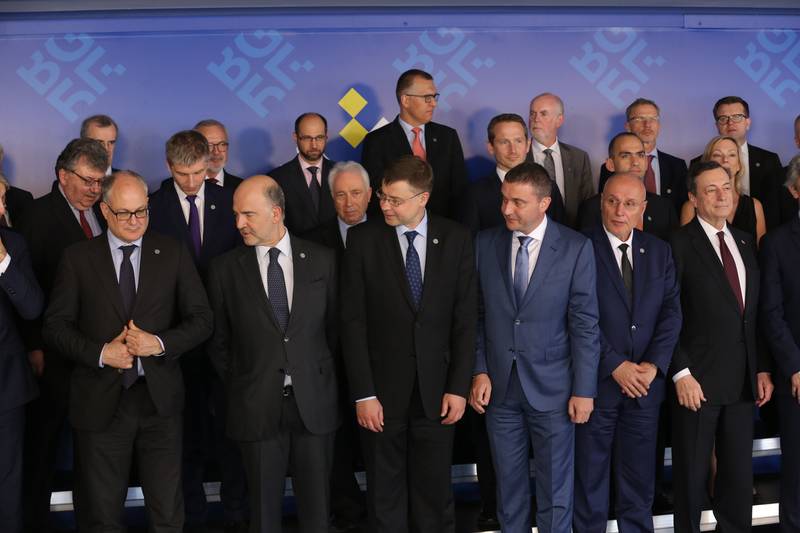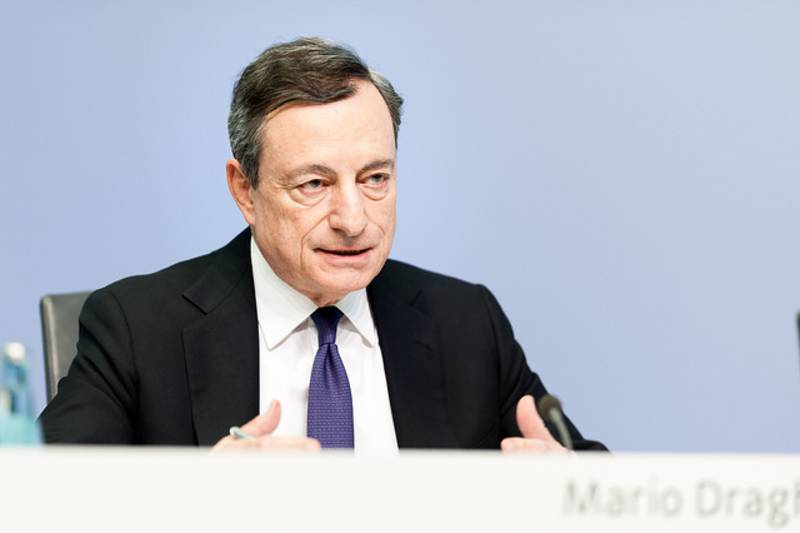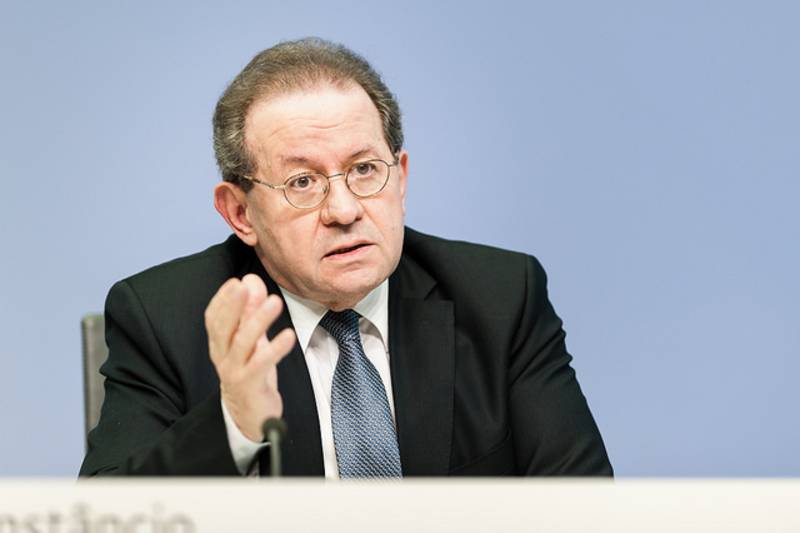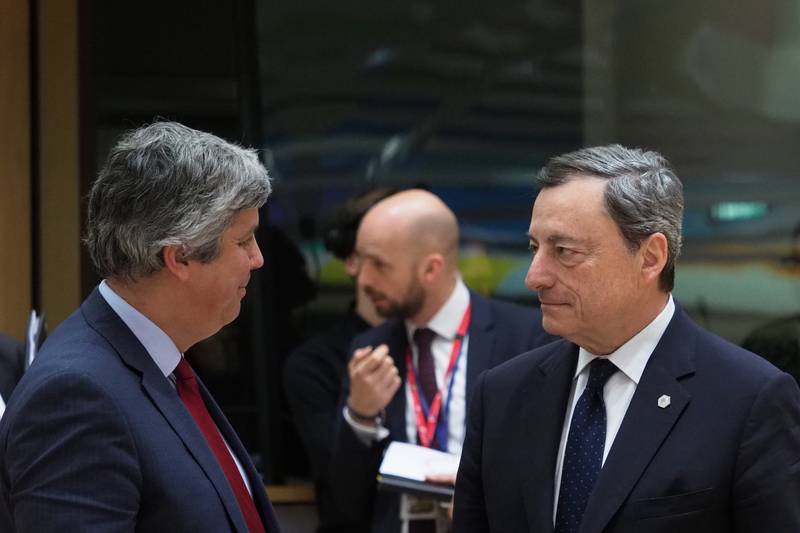Normalisation of Growth in the Euro Area or Dark Clouds?
Adelina Marini, May 1, 2018
 It is growingly evident that by June, when the deadline of Donald Tusk's Leaders' Agenda expires, there will be not even an 'r' left of the euro area reforms. The question is, though, whether circumstances would push the member states, again, to be more active. And the circumstances are a weakening economic growth in the euro area since the beginning of the year. At this stage, the EU is not worried. Eurogroup chief Mario Centeno (Portugal, independent) said after the informal meeting of the euro area finance ministers in Sofia, on Friday, that this issue was not discussed but that European Central Bank President Mario Draghi (Italy) explained the situation to the ministers in great detail. "[W]e firmly believe that the actions that we are taking towards reform of the eurozone reinforcing all the components of the single market should and would contribute to continuing strong economic growth".
It is growingly evident that by June, when the deadline of Donald Tusk's Leaders' Agenda expires, there will be not even an 'r' left of the euro area reforms. The question is, though, whether circumstances would push the member states, again, to be more active. And the circumstances are a weakening economic growth in the euro area since the beginning of the year. At this stage, the EU is not worried. Eurogroup chief Mario Centeno (Portugal, independent) said after the informal meeting of the euro area finance ministers in Sofia, on Friday, that this issue was not discussed but that European Central Bank President Mario Draghi (Italy) explained the situation to the ministers in great detail. "[W]e firmly believe that the actions that we are taking towards reform of the eurozone reinforcing all the components of the single market should and would contribute to continuing strong economic growth".
The EU commissioner for economic affairs, Pierre Moscovici (France, S&D), said that there are no worries on this issue. This week the European Commission will present its spring forecast. "Basically, we see no change in our general approach and we believe that the recovery inside Europe, especially the euro area, is strong, solid, robust, that it is long-lasting, and that with the support of adapted policies and reforms it can be maintained", he said in Sofia on Friday. European Commission Vice President, responsible for the euro, Valdis Dombrovskis (Latvia, EPP), was also an optimist saying that he expected the economic growth to continue.
He said, however, that during the IMF spring meetings in Washington the dark clouds ahead were discussed and used the moment to again urge for completion of the euro area. "That is why, also from European Commission side, we are emphasising so much that we need to strengthen the euro area and EU resilience now, we need to complete the EMU, we need to prepare for times when this economic growth conditions will not be so favourable as currently", he said, also in Sofia, after the end of the informal meeting of the EU finance ministers.
Last week, the ECB admitted that there is a deceleration of the euro area economy but it did not discuss a change of monetary policy. Governing Council members shared information about the situations in their own countries individually. President Draghi was submitted to strong pressure by journalists with questions whether it was high time to start discussing next steps. He agreed that those questions were justified. "Well, the reason why we didn't discuss monetary policy per se is that the reading of the current developments since the beginning of the year is actually very important in deciding the next steps. Careful assessment, monitoring, the use of more information, are all important components in the next decisions".
ECB is still not yet sure whether this is about a temporary or a permanent condition, whether it is about a significant decline or just a normalisation after a long period of strong economic growth. Even before the questions that moved around the deceleration of the economy Mario Draghi touched upon the issue in his introductory statement using the word "moderation". "Following several quarters of higher than expected growth, incoming information since our meeting in early March points towards some  moderation, while remaining consistent with a solid and broad-based expansion of the euro area economy", said Mr Draghi.
moderation, while remaining consistent with a solid and broad-based expansion of the euro area economy", said Mr Draghi.
The real gross domestic product grew by 0.7% on a quarter-to-quarter basis in the fourth quarter of 2017, thus confirming the expansion of the previous quarter. This led to an average annual growth in 2017 of 2.4% - the highest since 2007, i.e. before the beginning of the euro area debt crisis. ECB says that the latest economic indicators suggest a moderation of the growth dynamics since the beginning of the year. It could be the result of temporary factors, like cold weather in some countries, strikes in others, or Easter.
Significant declines have been registered in the purchasing managers indices in almost all sectors, in retail, sales, manufacturing, services, construction. The PMI of export orders has also declined. In some cases, the declines are significant and unexpected, said the ECB chief. The bank's analysis shows that growth will continue to be solid because business investments continue to grow, housing investments are also improving. Risks for the economy continue to be broadly based but global factors risks have become more prominent, especially the protectionism threat, Mario Draghi explained.
The Governing Council discussed the situation cautiously, he added. In the same time, there is concern that there still are no signals that the inflation target of close to, but below 2% will be reached. There are some encouraging upward movements of nominal wages which could lead to inflationary pressures in the coming months. According to ECB Vice President Vitor Constancio (Portugal), for whom the press conference on 26 April was the last as his mandate is expiring (he will be replaced by Spain's ex-finance minister Luis De Guindos), when looking back there is reason for optimism. Against the backdrop of the job done, it is now evident that the euro area is on a normalisation path which leads to the ECB's target for price stability of close to, but below 2% inflation.
Asked to deliberate on monetary policy per se and the challenges ahead, Vitor Constancio said that the unconventional measures package is now part of the tool-kit of monetary policy and will be used whenever necessary. In the longer term, however, it is unlikely to "go back to the simple life of monetary policy as it used to be" with small central banks' balance sheets and monetary policy just targeting overnight money market rates. He expects things to change because the structure of the financial system has changed significantly. Even in Europe, the system is much less dependent on banks than before.
In 2007, for example, on the eve of the crisis, 61% of the debt instruments were bank loans. Last year, that share fell to 45%. But if the entire external financing is taken into account for non-financial firms, then it is evident that bank loans represent just 15%. Besides, the financial sector has become much more complex and important. These changes mean that monetary policy will change in the future, Mr Constancio explained. He does not expect the next crisis to be of the same magnitude as the last one but warned that there will be a new recession episode. "The conditions now of inertia, of self-sustainability, of growth at this moment in the euro area allow us to contemplate a few years of growth if  there are no external shocks that can derail this smooth development. We all know that these external shocks may indeed happen", the ECB vice president concluded.
there are no external shocks that can derail this smooth development. We all know that these external shocks may indeed happen", the ECB vice president concluded.
In the last months, President Draghi enhanced his calls to complete the euro area and especially the banking union. He admitted that the debate on the banking union has taken too long and underscored that the decision the leaders took in 2012 to create a banking union was provoked by the need to address the obvious fragilities of the monetary union which became evident during the crisis but existed before it. "It's overdue; progress should be made, that's what we say each and every time in our Introductory Statement", Mario Draghi said but urged for patience.
"It's apparent that the political decisions that underpin such progress are easier in certain countries than others. We have to be patient; simply there is no alternative. We have to be patient", he reassured and announced that leaders are completely aware that the monetary union will remain fragile if no progress is achieved. "That is something we know for sure. It's something on which all of us can count; their awareness". Vice President Dombrovskis assured in Sofia that there is progress. He expects some movements on the banking union package yet at the next EU finance ministers meeting in May. Valdis Dombrovskis admitted, however, that there is still a lot of work to be done by June.
 Angela Merkel, Emmanuel Macron | © Council of the EU
Angela Merkel, Emmanuel Macron | © Council of the EU Benoit Coeure | © Council of the EU
Benoit Coeure | © Council of the EU Mario Centeno, Mario Draghi | © Council of the EU
Mario Centeno, Mario Draghi | © Council of the EU Klaus Regling | © Council of the EU
Klaus Regling | © Council of the EU Mario Centeno | © Council of the EU
Mario Centeno | © Council of the EU Mario Centeno | © Council of the EU
Mario Centeno | © Council of the EU